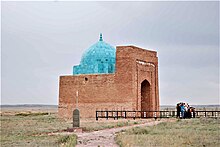
Year 1227 (MCCXXVII) was a common year starting on Friday of the Julian calendar.

The Golden Horde, self-designated as Ulug Ulus, was originally a Mongol and later Turkicized khanate established in the 13th century and originating as the northwestern sector of the Mongol Empire. With the division of the Mongol Empire after 1259, it became a functionally separate khanate. It is also known as the Kipchak Khanate or as the Ulus of Jochi, and it replaced the earlier, less organized Cuman–Kipchak confederation.
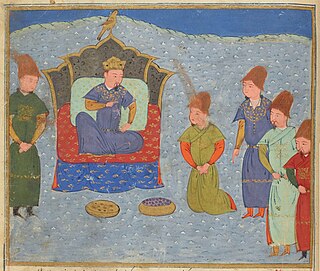
Batu Khan was a Mongol ruler and founder of the Golden Horde, a constituent of the Mongol Empire. Batu was a son of Jochi, thus a grandson of Genghis Khan. His ulus ruled over the Kievan Rus', Volga Bulgaria, Cumania, and the Caucasus for around 250 years.
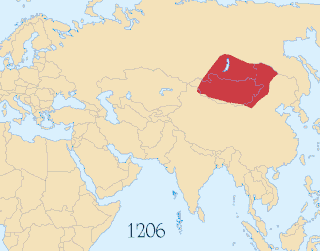
The Mongol Empire of the 13th and 14th centuries was the largest contiguous empire in history. Originating in present-day Mongolia in East Asia, the Mongol Empire at its height stretched from the Sea of Japan to parts of Eastern Europe, extending northward into parts of the Arctic; eastward and southward into parts of the Indian subcontinent, attempted invasions of Southeast Asia, and conquered the Iranian Plateau; and westward as far as the Levant and the Carpathian Mountains.
Börte was the first wife of Temüjin, who became Genghis Khan, the founder of the Mongol Empire. Börte became the head of the first Court of Genghis Khan, and Grand Empress of his Empire. Little is known about the details of her early life, but she was betrothed to Genghis at a young age, married at seventeen, and then kidnapped by a rival tribe. Her husband's daring rescue of her may have been one of the key events that started him on his path to becoming a conqueror. She gave birth to four sons and five daughters, who, along with their own descendants, were the key bloodline that further expanded the Mongol Empire.

Ögedei Khan was the second ruler of the Mongol Empire. The third son of Genghis Khan, he continued the expansion of the empire that his father had begun.
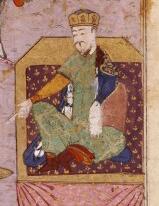
Güyük Khan was the third Khagan of the Mongol Empire, the eldest son of Ögedei Khan and a grandson of Genghis Khan. He reigned from 1246 to 1248. He started his military career by participating in the conquest of Eastern Xia and then later in the invasion of Europe. When his father died, he was enthroned as Khagan in 1246. During his almost two year reign, he reversed some of his mother's unpopular edicts and ordered an empire-wide census; he also held some authority in Eastern Europe, appointing Andrey II as the grand prince of Vladimir and giving the princely title of Kiev to Alexander Nevsky.
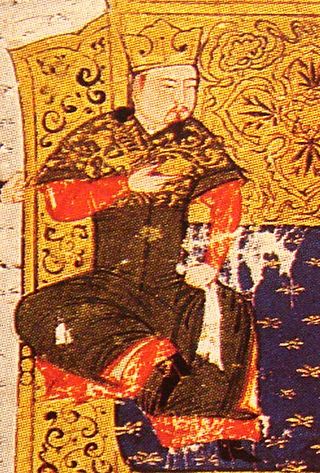
Tolui was the youngest son of Genghis Khan and Börte. A prominent general during the early Mongol conquests, Tolui was a leading candidate to succeed his father after his death in 1227 and ultimately served as regent of the Mongol Empire until the accession of his brother Ögedei two years later. Tolui's wife was Sorghaghtani Beki; their sons included Möngke and Kublai, the fourth and fifth khagans of the empire, and Hulagu, the founder of the Ilkhanate.

Chagatai Khan was the second son of Genghis Khan and Börte. He inherited most of what are now five Central Asian states after the death of his father. He was also appointed by Genghis Khan to oversee the execution of the Yassa, the written code of law created by Genghis Khan.
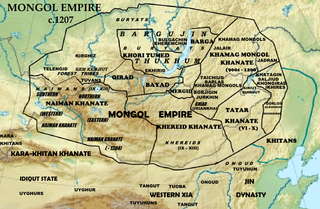
A Borjigin is a member of the Mongol sub-clan that started with Bodonchar Munkhag of the Kiyat clan. Yesugei's descendants were thus said to be Kiyat-Borjigin. The senior Borjigids provided ruling princes for Mongolia and Inner Mongolia until the 20th century. The clan formed the ruling class among the Mongols and some other peoples of Central Asia and Eastern Europe. Today, the Borjigid are found in most of Mongolia, Inner Mongolia and Xinjiang, and genetic research has shown that descent from Genghis Khan and Timur is common throughout Central Asia and other regions.

Sorghaghtani Beki or Bekhi, also written Sorkaktani, Sorkhokhtani, Sorkhogtani, Siyurkuktiti, posthumous name Empress Xianyi Zhuangsheng, was a Keraite princess and daughter-in-law of Genghis Khan. Married to Tolui, Genghis' youngest son, Sorghaghtani Beki became one of the most powerful and competent people in the Mongol Empire. She made policy decisions at a pivotal moment that led to the transition of the Mongol Empire towards a more cosmopolitan and sophisticated style of administration. She raised her sons to be leaders and maneuvered the family politics so that all four of her sons, Möngke Khan, Hulagu Khan, Ariq Böke, and Kublai Khan, went on to inherit the legacy of their grandfather.

Berke Khan was a grandson of Genghis Khan from his son Jochi and a Mongol military commander and ruler of the Golden Horde who effectively consolidated the power of the Blue Horde and White Horde from 1257 to 1266. He succeeded his brother Batu Khan of the Blue Horde (West), and was responsible for the first official establishment of Islam in a khanate of the Mongol Empire. Following the Sack of Baghdad by Hulagu Khan, his cousin and head of the Mongol Ilkhanate based in Persia, he allied with the Egyptian Mamluks against Hulagu. Berke also supported Ariq Böke against Kublai in the Toluid Civil War, but did not intervene militarily in the war because he was occupied in his own war against Hulagu and the Ilkhanate.

Orda Ichen was a Mongol Khan and military strategist who ruled the eastern part of the Golden Horde during the 13th century.
The family tree of Genghis Khan is listed below. This family tree only lists prominent members of the Borjigin family and does not reach the present. Genghis Khan appears in the middle of the tree, and Kublai Khan appears at the bottom of the tree. The Borjigin family was the imperial house of the Mongol Empire, dating back to the 13th and 14th centuries.

Genghis Khan, also Chinggis Khan, was the founder and first khan of the Mongol Empire, which he ruled from 1206 until his death in 1227; it later became the largest contiguous empire in history. After spending most of his life uniting the Mongol tribes, he launched a series of military campaigns, conquering large parts of China and Central Asia.
Shigi Qutuqu was a high-ranking official during the first decades of the Mongol Empire. The adopted son of the empire's founder Temüjin and his wife Börte, Shigi Qutuqu played an important role in the codification of Mongol law, serving with distinction as an administrator in North China. He may also have been the author of the Secret History of the Mongols, which alters and augments his position in early Mongol society.
Between 1219 and 1221, the Mongol forces under Genghis Khan invaded the lands of the Khwarazmian Empire in Central Asia. The campaign, which followed the annexation of the Qara Khitai Khanate, saw widespread devastation and atrocities. The invasion marked the completion of the Mongol conquest of Central Asia, and began the Mongol conquest of Persia.
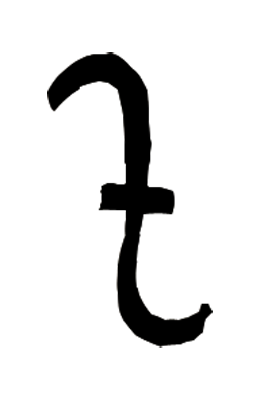
The House of Ögedei, sometimes called the Ögedeids, was an influential Mongol family and a branch of the Borjigin clan from the 12th to 14th centuries. They were descended from Ögedei, a son of Genghis Khan who succeeded his father to become the second khagan of the Mongol Empire. Ögedei continued the expansion of the Mongol Empire.
The Toluid Civil War was a war of succession fought between Kublai Khan and his younger brother, Ariq Böke, from 1260 to 1264. Möngke Khan died in 1259 with no declared successor, precipitating infighting between members of the Tolui family line for the title of Great Khan that escalated to a civil war. The Toluid Civil War, and the wars that followed it, weakened the authority of the Great Khan over the Mongol Empire and split the empire into autonomous khanates.
The division of the Mongol Empire began after Möngke Khan died in 1259 in the siege of Diaoyu Castle with no declared successor, precipitating infighting between members of the Tolui family line for the title of khagan that escalated into the Toluid Civil War. This civil war, along with the Berke–Hulagu war and the subsequent Kaidu–Kublai war, greatly weakened the authority of the great khan over the entirety of the Mongol Empire, and the empire fractured into four khanates: the Golden Horde in Eastern Europe, the Chagatai Khanate in Central Asia, the Ilkhanate in Southwest Asia, and the Yuan dynasty in East Asia based in modern-day Beijing – although the Yuan emperors held the nominal title of khagan of the empire.



